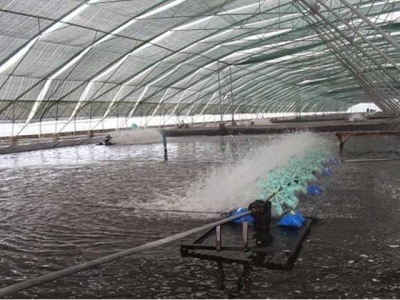Hi-tech agriculture largely unknown to farmers: seminar

A high-tech shrimp farming project in the Mekong Delta - PHOTO: TRUNG CHANH
SOC TRANG – Introducing high-tech applications into agriculture is the most viable way to improve income for farmers and spur growth in the sector, but farmers for the most part are not aware of such a trend, heard a seminar in the Mekong Delta province of Soc Trang on June 18.
Speaking at the seminar titled “High-tech applications for Agriculture in Soc Trang – Reality and Solutions,” several experts pointed out that high-tech agriculture remained largely unknown to farmers, not only in Soc Trang but across the country. Worse still, participation by enterprises is very modest, proven by the fact that farmland of high-tech applications accounts for a trivial fraction of the total agricultural area.
Nguyen Thi Thanh Thuy, head of the Department for Science, Technology and Environment under the Ministry of Agriculture, told the seminar that high-tech agriculture is the only way to realize growth targets for the sector.
Last year, Vietnam earned US$36.37 billion from farm produce exports, and the target for this year is over US$40 billion, she said. However, agricultural production under traditional farming methods has hit the upper limit, and any breakthrough requires the role of science and technology.
In reality, however, farmers across the country have not taken to high-tech agriculture, she said.
Professor Vo Tong Xuan, a well-known agronomist now serving as president of South Can Tho University, told the Daily on the sidelines of the seminar that even enterprises have not played their role in high-tech agriculture. Throughout the country, there are only 14 or so high-tech farming projects with a combined area of 5,000 hectares, just a drop in the ocean as the country’s total farmland amounts to four million hectares.
To respond to the Government’s orientation to develop high-tech agriculture, many localities have mapped out their own plans to shift to the new trend, but “in my opinions, such development is still limited to a few models to grow certain types of organic vegetable as a theatrical show,” the professor said.
Meanwhile, farmers for the most part are still unaware of high-tech agriculture and still stick to their old methods, producing unhygienic and low-quality items of low value, so they are still poor, he said.
Vu Kim Hanh, director of the Business Studies and Assistance Center, observed that high-tech applications in agriculture are uneven. “There are enterprises and cooperatives seeking to adapt to high-tech agriculture, but such applications are launched into only some steps rather than throughout the entire value chain,” she said.
Corporate involvement in high-tech agriculture, according to Hanh, is made either by non-agriculture giants which want to test a new business front by injecting a small proportion of their capital into the sector, or by young startups. Therefore, high-tech applications in agriculture are still limited and not enough to enhance the competitiveness of Vietnamese farm produce in regional and global markets.
Hanh noted that product safety and high added value are two vital factors for agriculture growth, but “such factors relate to the whole value chain, from material zone development to investment in production and processing.”
The seminar yesterday was a prelude to an investment promotion conference slated for today, June 19, in Soc Trang Province, where high-tech agriculture alongside renewable energy and tourism projects will be put forth to call for investors.
The event, to be graced by Prime Minister Nguyen Xuan Phuc, will be attended by around 500 delegates from central agencies and ministries, international organizations, banks and potential investors among others.
Related news
 Cashew nut exports increase, but processors face shortage of raw materials
Cashew nut exports increase, but processors face shortage of raw materials Việt Nam exported 141,000 tonnes of cashew nuts for a value of U$$1.39 billion in the first five months of the year, a year-on-year increase of 21.4 per cent
 Bright prospect predicted for agricultural products’ export
Bright prospect predicted for agricultural products’ export Good prospect is forecast in the export of several agricultural products, including rice, in the rest of the year as demand in importing markets has shown
 Plenty of opportunities for fruit and veg to meet Japan’s needs
Plenty of opportunities for fruit and veg to meet Japan’s needs Exports of Vietnamese fruit and vegetables to Japan have grown strongly in recent times, especially when it comes to stone fruits